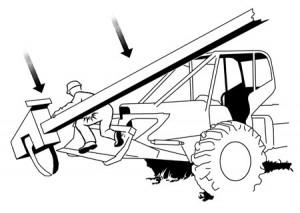BACKGROUND: On a late winter afternoon in the West, a company’s mechanic was repairing a stroke delimber. Weather conditions were good—cool and clear.
PERSONAL CHARACTERISTICS: The experienced mechanic was in his 40s, and had worked in the woods for more than 30 years.
UNSAFE ACT OR CONDITION: The mechanic finished repairing a piece of equipment faster than anticipated and decided to move to the next project without informing anyone of his whereabouts.
This second repair was of a stroke delimber located on a different portion of the logging job, an adjacent piece of property. While standing on the blade of a skidder, the mechanic set the boom of the stroke delimber next to him on the blade of the skidder, so he could put the safety chain in place before starting the repair. When the chain wouldn’t engage, he attempted to jump off the skidder. At that time, the delimber’s hydraulic pressure bled off, and the boom lowered. The mechanic’s upper leg was caught between the boom of the delimber and the blade of the skidder.
ACCIDENT: The boom pinned the mechanic’s leg to the skidder blade. The delimber’s hydraulic pressure continued to bleed off, and the additional weight of the boom made it impossible for the mechanic to free himself. He tried to call for help, but no one was in close enough proximity to hear him. He had his cell phone, but coverage was poor, and he couldn’t complete a call. Fortunately, he continued to dial 911, and the authorities were able to trace his location and to send help to the logging site.
INJURY: The mechanic’s bones and nerves were completely crushed and for months it was unknown if he would lose his leg, or his ability to walk normally. (NOTE: This incident happened more than six years ago, and the mechanic forged through the painful therapy, is fully recovered, and is still employed by the same company.)
RECOMMENDATIONS FOR CORRECTION:
- Logging employees working in the woods must maintain “visual or audible” contact with others; for instance, by means of a whistle to alert nearby workers, or with a two-way radio device (walkie-talkie).
- If you must be alone in the woods, ensure that someone knows your whereabouts and timeline for returning.
- Have a plan in place for when working in areas of poor cell service.
- Have a check-in policy, so that each worker is accounted for every 30 minutes (or other suitable timeframe).
- Use correct tools for job. A stand under the boom of the stroke delimber would have been more appropriate and safer.
- The skidder blade (and all moving parts with stored energy) should be grounded before working on them.
 Courtesy of the Forest Resources Association: https://www.forestresources.org/
Courtesy of the Forest Resources Association: https://www.forestresources.org/
